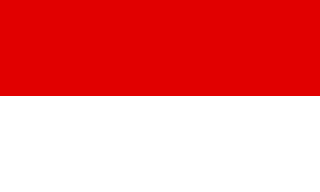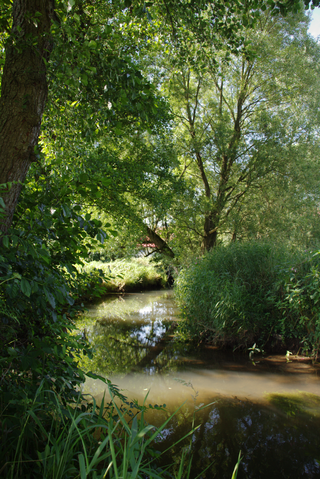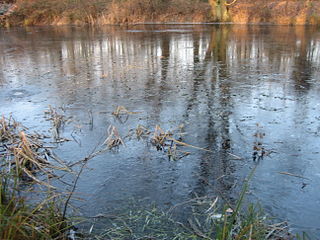
Hesse or Hessia, officially the State of Hesse, is a state in Germany. Its capital city is Wiesbaden, and the largest urban area is Frankfurt, which is also the country's principal financial centre. Two other major historic cities are Darmstadt and Kassel. With an area of 21,114.73 square kilometers and a population of over six million, it ranks seventh and fifth, respectively, among the sixteen German states. Frankfurt Rhine-Main, Germany's second-largest metropolitan area, is mainly located in Hesse.

Kassel is a city on the Fulda River in northern Hesse, in central Germany. It is the administrative seat of the Regierungsbezirk Kassel and the district of the same name, and had 201,048 inhabitants in December 2020. The former capital of the state of Hesse-Kassel, it has many palaces and parks, including the Bergpark Wilhelmshöhe, which is a UNESCO World Heritage Site. Kassel is also known for the documenta exhibitions of contemporary art. Kassel has a public university with 25,000 students (2018) and a multicultural population.

Siddhartha: An Indian novel is a 1922 novel by Hermann Hesse that deals with the spiritual journey of self-discovery of a man named Siddhartha during the time of the Gautama Buddha. The book, Hesse's ninth novel, was written in German, in a simple, lyrical style. It was published in the United States in 1951 by New Directions Publishing and became influential during the 1960s. Hesse dedicated the first part of it to the French writer Romain Rolland and the second part to Wilhelm Gundert, his cousin.

The Lahn is a 245.6-kilometre-long (152.6 mi), right tributary of the Rhine in Germany. Its course passes through the federal states of North Rhine-Westphalia (23.0 km), Hesse (165.6 km), and Rhineland-Palatinate (57.0 km).

The Rhine Province, also known as Rhenish Prussia or synonymous with the Rhineland, was the westernmost province of the Kingdom of Prussia and the Free State of Prussia, within the German Reich, from 1822 to 1946. It was created from the provinces of the Lower Rhine and Jülich-Cleves-Berg. Its capital was Koblenz and in 1939 it had 8 million inhabitants. The Province of Hohenzollern was militarily associated with the Oberpräsident of the Rhine Province. Also, for a short period of time, the Province of Hohenzollern was indirectly and de facto controlled by the Rhine Province.

Hessischer Rundfunk, shortened to HR, is the German state of Hesse's public broadcasting corporation. Headquartered in Frankfurt, it is a member of the national consortium of German public broadcasting corporations, ARD.

The Selz is a river in Rhineland-Palatinate, Germany, and a left hand tributary of the Rhine. It flows through the largest German wine region, Rheinhessen.

The Dill is a 55 km (34 mi) long river, flowing through central Hesse in Germany. It is a tributary to the Lahn, joining it on the right bank at the town of Wetzlar.
The term Upper Hesse originally referred to the southern possessions of the Landgraviate of Hesse, which were initially geographically separated from the more northerly Lower Hesse by the County of Ziegenhain.

The West Hesse Highlands, also known as the West Hessian Lowlands and Highlands, are a heavily forested region of the Central Uplands in Germany. These highlands lie mainly within the state of Hesse, between that part of the Rhenish Massif right of the Rhine in the west, the Weser Uplands to the north, the Hessian Central Uplands to the east and the Wetterau to the south.

The West Hesse Depression is part of the West Hesse Highlands and Lowlands region in the north of the German state of Hesse. Like the East Hesse Depression, it is a series of separate depressions that form a natural corridor and have been an important historical trade route.
The East Hesse Highlands describes a heavily wooded range of hills lying mainly in the German state of Hesse, but also extending a little way into Lower Saxony to the north, Thuringia to the east and Bavaria to the southeast. The region is sandwiched between the West Hesse Depression to the west, the Weser Uplands to the north, the Thuringian Basin to the northeast, the northwestern edge of the Thuringian Forest to the east, the Spessart to the south and the Wetterau to the southwest.
The Gellibrand River is a perennial river of the Corangamite catchment, located in the Otways region of the Australian state of Victoria.

The Weschnitz is a 59.4-kilometre-long (36.9 mi) right tributary of the Rhine running through the German states of Hesse and Baden-Württemberg. The name of the river traces to the Celtic god Visucius, who was worshiped in the region.

Döllbach is a river of Bavaria and Hesse, Germany. It flows into the Fliede near Eichenzell.

Elbbach is a river in Germany, about 38.1 kilometres (23.7 mi) long. It is a right tributary of the Lahn which in turn is a right tributary of the Rhine. The Elbbach starts near Westerburg in the state of Rhineland-Palatinate, and flows into the Lahn near Limburg an der Lahn in the state of Hesse. The drainage basin of this river has an area of 323.67 square kilometres (124.97 sq mi).

The Ilsbach is a river of Hesse, Germany. It is a 20.7 km long, right-bank tributary of the Seenbach and flows into it in Mücke.

Liederbach is a river of Hesse, Germany. It is a right tributary of the Main near Höchst.

A woog is the local name for a body of still water in parts of southwest Germany. A woog may be of natural origin or manmade.

















